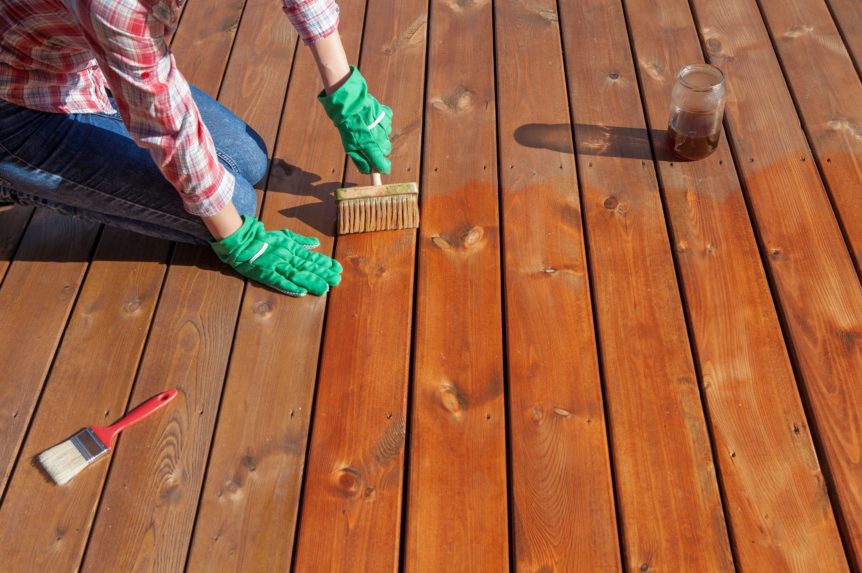
Types of Porches and Decks and How Much They Cost
There are several different kinds of porches and decks. Some have no covering and are fully exposed to the elements. Others may have a roof, fenced-in walls, or screens. The type of porch that you have will determine the kind of flooring materials that you can use.
Keep in mind that if you are going to install porch flooring in an area where it will be rained on, you must be sure to slope the level of the surface to provide for proper drainage. Grading the land around the porch can also help to prevent liquids from pooling on its surface, causing potential problems.
Pressure Treated Pine Porch Flooring
This material accounts for 80% of all deck floor surface coverings. Pressure treated pine is durable, weather resistant, inexpensive, and long-lasting. Make sure to use grade 1 material for railings and stairs, and grade 2 material for standard floorboards. After installation, allow it to dry out for 3 – 6 months. Then a quality deck sealing agent needs to be applied to protect its surface from water and UV rays. However, some materials will come pre-treated from the factory with sealant, a stain coat, or both, so just be sure to check.
Typically, this type of flooring costs $10 – $16 per square foot, not including the frame of the porch itself. However, this material has the potential to add up to $15 per square foot in value to the home in the first year after it is installed. Pressure treated pine can also last for up to 15 years in most climates, though it will over time darken and crack from rain and wear.
Redwood Porch Flooring
This is an exotic wood porch flooring choice that features a pleasant red hue. It’s easier to cut than pine and will slice down with clean, straight cuts. It’s rugged and durable. It doesn’t degrade from normal weathering and is resistant to rot, mold, and insects. Because of this, you don’t need to worry about a wood sealant. A redwood porch floor can last 1 – 2 decades or longer, with no preventative maintenance. However, they can understandably be quite expensive, ranging from $18 to $22 per square foot, and that doesn’t include the understructure of the porch.
Cedarwood Porch Floors
Cedarwood is another attractive, and natural porch flooring option, but is also rather expensive. It’s naturally resistant to weather, mold, rot, and vermin, and like redwood, does not require a sealant. It can last for decades under normal usage and is more readily available than redwood. However, it’s also just as expensive as redwood, ranging in price from $17 to $23 per square foot for just the flooring materials and installation.
Resilient Vinyl Click Together Flooring
No longer just for interiors, vinyl is resistant to water, stains, vermin, mold, and almost anything the natural environment can throw at it. It’s low maintenance, easy to clean, and the factory generally UV treats it. It’s also relatively inexpensive. With porch flooring, you generally find vinyl in the form of planks and boards, which assemble by clicking together to form an integrated overall structure. Ranging in price from $8 – $10 per square foot (though high-end options can go as high as $20), it’s affordable as well as durable. However, despite UV protection, its coloration can begin to fade over time due to overexposure.
Plastic Wood Composites
These materials consist of recycled plastic that’s mixed with discarded wood fibers, creating a composite that has the properties of both. It looks a lot like natural wood, and is extremely durable and resistant to damage, water, stains, mold, and UV fading. They also won’t splinter or crack. They can last for decades with no-to-little maintenance, and many retailers will even offer a 10-20-year warranty on plastic wood composites. Composites are great for interior and exterior porches, but they can also be expensive, averaging $18 to $22 per square foot. They tend to last a long time, though there can be some fading with age. Also keep in mind though that in some cases, local zoning boards won’t allow this material to be used for environmental reasons.
Brick Porch Flooring
Brick pavers are warm, friendly, natural, and able to weather the environment of most locations. They also add a charming look to any outdoor space! Made from clay that’s fired into tiles, these materials are heavy and are usually only used in porches made entirely from brick or other stone materials. When you install, you should treat the floor surface at least once with a UV shield chemical sealant. After that, you can reapply periodically, or let the bricks shape and wear with the weather.




